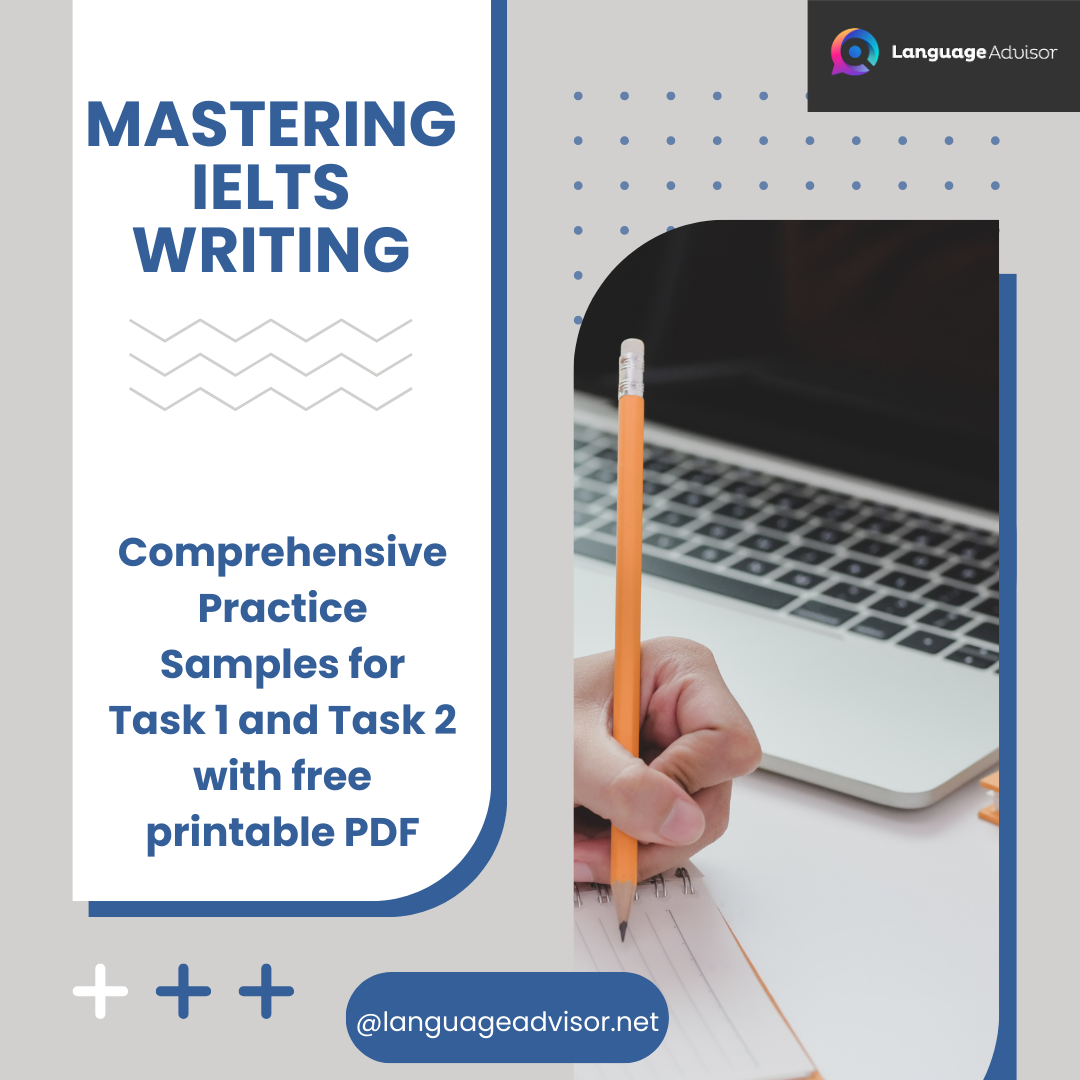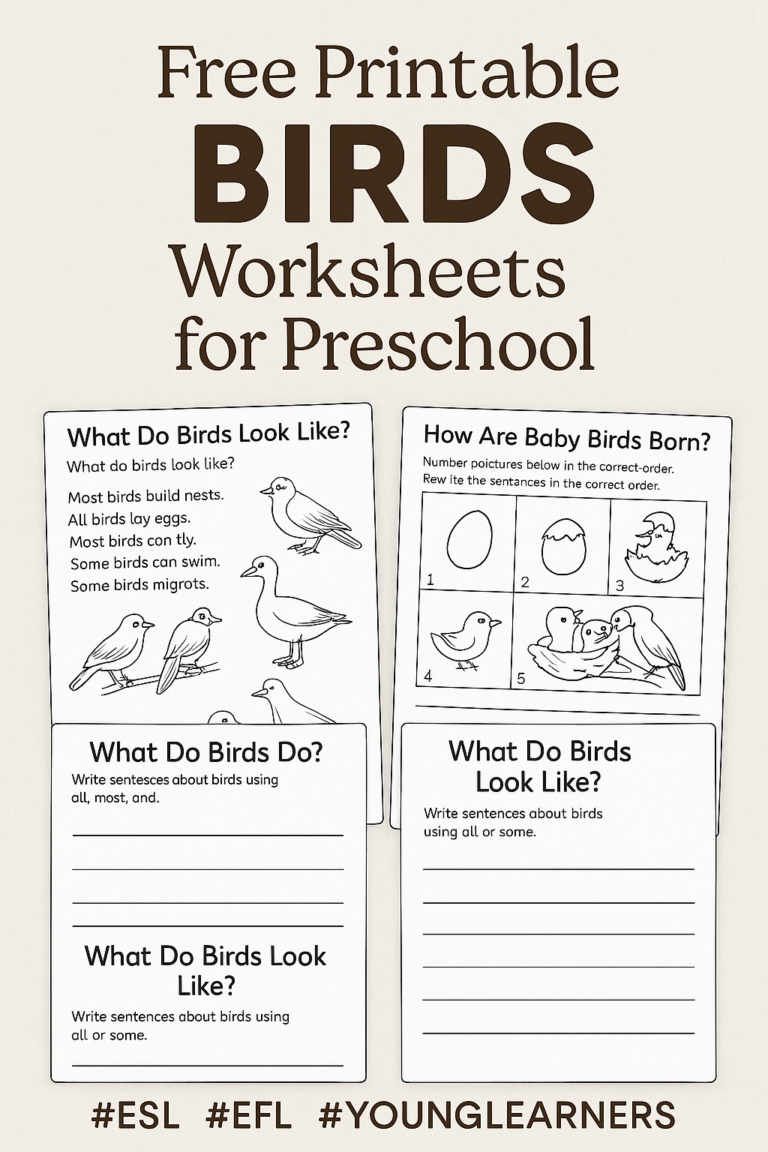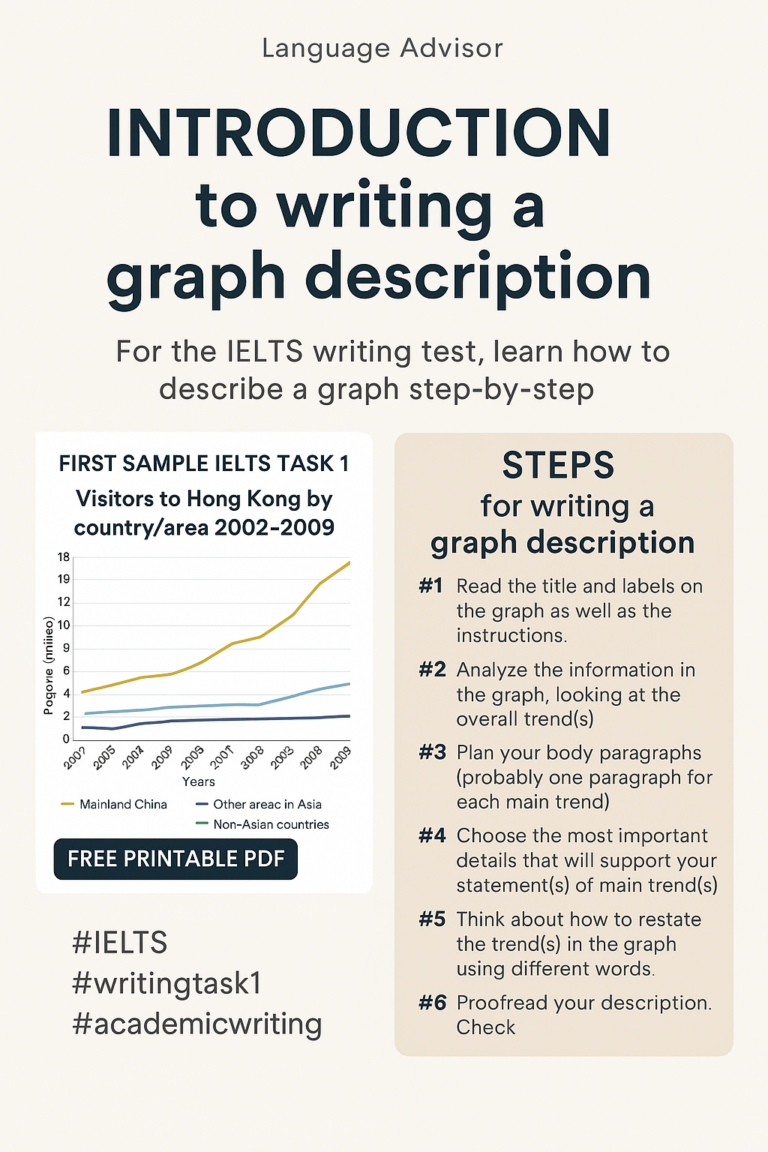Mastering IELTS Writing: Comprehensive Practice Samples for Task 1 and Task 2 with free printable PDF
Mastering IELTS Writing

Mastering IELTS Writing
The IELTS Writing test is a critical component of both the General Training and Academic versions of the exam. It assesses your ability to write clearly, coherently, and accurately in English. The test comprises two tasks: Task 1, which varies between the General Training and Academic tests, and Task 2, which is a formal essay in both versions. This blog post provides comprehensive practice samples for both tasks in the General Training and Academic tests. By practicing with these examples, you can improve your writing skills and increase your chances of achieving a high band score.
IELTS Writing Task 1
Task 1: Descriptive and Analytical Writing
In the Academic Writing Task 1, you are required to describe visual information presented in graphs, charts, tables, maps, or diagrams. You need to summarize the data, compare it, and explain the key trends.
Example Exercises:
- Bar Charts and Line Graphs: Describe a bar chart showing the population growth in different cities. Analyze a line graph illustrating the unemployment rates over a decade.
- Pie Charts and Tables: Compare two pie charts depicting the market share of different smartphone brands. Summarize a table showing the average monthly expenses of households in various countries.
- Maps and Diagrams: Explain the changes in a town map over 20 years. Describe the process diagram showing how coffee is produced and packaged.
Tips for Task 1:
- Identify the main trends and compare significant data points.
- Use a range of vocabulary and complex sentence structures.
- Organize your response logically with clear paragraphs.
DOWNLOAD THE PDF FOR FREE
IELTS Writing Academic
IELTS Writing General Task
IELTS Sample Task 1

Task 2: Argumentative and Discursive Essays
Task Description: In Academic Writing Task 2, you will write an essay in response to a point of view, argument, or problem. You need to present and justify your opinions, compare different ideas, or propose solutions.
Example Exercises:
- Opinion Essays: Discuss whether the government should provide free healthcare for all citizens. Argue for or against the idea that technology improves our quality of life.
- Discussion Essays: Compare the advantages and disadvantages of working from home. Discuss both sides of the argument on whether students should take a gap year before university.
- Problem-Solution Essays: Analyze the causes of air pollution in urban areas and suggest some solutions. Discuss the problems associated with overpopulation and propose measures to address them.
- Advantages-Disadvantages Essays: Examine the advantages and disadvantages of online education. Discuss the benefits and drawbacks of living in a big city.
Tips for Task 2:
- Structure your essay with a clear introduction, body paragraphs, and a conclusion.
- Support your arguments with examples and evidence.
- Use a formal tone and academic language.

IELTS General Training Writing Samples
Task 1: Informal, Semi-Formal, and Formal Letters
Task Description: In General Training Writing Task 1, you are required to write a letter in response to a given situation. The letter could be informal, semi-formal, or formal, depending on the context.
Example Exercises:
- Informal Letters: Write a letter to a friend inviting them to your birthday party. Apologize to a friend for missing their wedding.
- Semi-Formal Letters: Write a letter to your landlord explaining a problem with the apartment. Request information about a course from a training center.
- Formal Letters: Write a letter to a company complaining about a product you purchased. Apply for a job and explain why you are a suitable candidate.
Tips for Task 1:
- Identify the tone and style appropriate for the letter.
- Organize your letter with a clear structure: opening, body, and closing.
- Use appropriate salutations and sign-offs.
Subtitle 4: Task 2: Argumentative and Discursive Essays
Task Description: Similar to the Academic version, General Training Writing Task 2 requires you to write an essay in response to a point of view, argument, or problem. The topics, however, are more related to everyday life and general interests.
Example Exercises:
- Opinion Essays: Discuss whether children should be encouraged to participate in competitive sports. Argue for or against the idea that social media has a negative impact on society.
- Discussion Essays: Compare the benefits and drawbacks of traveling by car versus public transport. Discuss both sides of the argument on whether people should retire at 65.
- Problem-Solution Essays: Identify the problems associated with traffic congestion in cities and propose solutions. Discuss the challenges of maintaining work-life balance and suggest ways to address them.
- Advantages-Disadvantages Essays: Examine the advantages and disadvantages of working remotely. Discuss the benefits and drawbacks of living in a multicultural society.
Tips for Task 2:
- Plan your essay before you start writing to ensure a clear structure.
- Develop your arguments logically with supporting details.
- Maintain a consistent and formal tone throughout your essay.

DOWNLOAD THE PDF FOR FREE
IELTS Sample Writing Task 2

Practicing with IELTS Writing samples is essential for honing your writing skills and boosting your confidence. Whether you are preparing for the General Training or Academic test, these exercises will help you familiarize yourself with the test format and improve your ability to articulate your thoughts clearly and coherently. Incorporate these practice samples into your study routine, seek feedback, and continuously refine your writing technique. With dedication and regular practice, you’ll be well-prepared to achieve a high band score in the IELTS Writing test. Good luck with your preparation!

Also check out these resources to successfully prepare for IELTS












